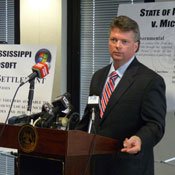State Auditor Stacey Pickering could complicate the state's recent $100 million settlement with Microsoft Corp. Mississippi Attorney General Jim Hood announced at a June 11 press conference that a $100 million settlement will be divided among state agencies and residents, with an estimated $40 million going to the state within 40 days, pending a settlement order from Hinds County Chancery Court Judge Denise Owens. Microsoft will also provide up to $60 million in hardware and software vouchers to consumers, businesses, and all county, local and municipal governmentsincluding public schools and districtsthat can prove purchase of Microsoft products.
Vouchers amount to $12 per purchase of Windows 95, 98 and ME operating systems, while Microsoft application software like Microsoft Office, Word, Excel and Microsoft operating systems like Windows XP, 2000 and Windows OS software older than Windows 3.0 qualify owners for a $5 voucher per purchase.
Hood said he hoped legislators put the state's portion of the settlement to immediate use in hacking out an agreement between the Democratic-led House and the Republican-dominated Senate over the state's budget. The Senate broke off negotiations with the House this month over a reinstituted hospital tax and the possibility of carrying over funds into the year 2011. The state will have to shut down its agencies if legislators come to no agreement by July 1.
Hood said Gov. Haley Barbour had full knowledge of the impending settlement the day the Senate to pulled out of budget negotiations earlier this month. Barbour's office did not return calls.
"I hope this $40 million will help to fill that gap," Hood, while admitting that he had no personal leverage over how legislators and the governor chose to handle the new cash influx. "I can't speak for them, but it will create a kind of a breath of fresh air to know that there may be some light at the end of the tunnel and help them get over the wire."
Hood contracted outside attorney Brent Hazzard to pursue the Microsoft settlement. Hazzard, in turn, subcontracted with Texas firm Susman Godfrey LLP and New York firm Boies, Schiller & Flexner. Hood said the attorneys are expecting to receive about $8 million for their services, though Microsoft will pay the attorney fees separately from the $100 million settlement.
Pickering says the Legislature should be the sole source of the contracted attorneys' payment, however.
"In these tough economic times, I appreciate the efforts of Attorney General Jim Hood on recovering the funds from Microsoft on behalf of the state of Mississippi," Pickering said.
"However, Miss. Code Ann. § 7-5-7 is clear that contingency fees paid to attorneys on behalf of the state must be appropriated by the Legislature."
Pickering is still pursuing disbarred attorneys Joey Langston and Timothy Balducci and the Langston Law Firm to return $14 million paid to them by MCI/WorldCom in a $126.2 million tax-fraud settlement with the state in 2005. Like Microsoft, WorldCom agreed to pay the state separately from the attorneys.
If Pickering succeeds in nullifying Hood's contract with the Langston firm, the state may have to pay the attorneys an extra $3 million. According to Hood's contract, the firm had earned $16.9 million, based on the amount of the WorldCom settlement. They had agreed to a more modest $14 million payment at Hood's request, but they could fall back on Hood's original $16.9 million sliding scale contract, should Pickering nullify their $14 million contract.
Hood also warned that an attack on the attorney fees in the Microsoft case could upend the $100 million settlement. Hood said the judge was making Mississippi wait more than 30 days because of the state's history with challenging attorney fees.
"Could (Pickering) contest this settlement, too? Sure he could, if he's OK with costing the state all this money," Hood said.
The Microsoft settlement brings to a close lawsuits launched by 21 states, including Mississippi, against the software giant for anti-competitive activity in the 1990s. Many were class-action lawsuits while others, like the Mississippi suit, were solely state suits without co-plaintiffs.
Hood said testimony from former Netscape CEO and Jackson native Jim Barksdale allowed the state to fare better in the settlement than many other states. (Mississippi was also the final state, Hood said, that settled with the massive software giant.)
"Having (Barksdale) as a sympathetic witness certainly weighed in our favor," Hood said, adding that Barksdale was the main influence spurring the state to add the $40 million exclusive payment to the state in the terms of the settlement.
Hood claimed Microsoft violated the law regarding state purchases of Microsoft-based software, including Windows OS systems and application programs, saying the software manufacturer designed its programs to steer computer and software purchasers to use Microsoft applications, rather than competing software, such as Internet browser Netscape. Netscape once dominated the browser market, but lost most of its 90 percent share of usage in the 1990s to Microsoft browser Internet Explorer by 2006.



Comments
Use the comment form below to begin a discussion about this content.